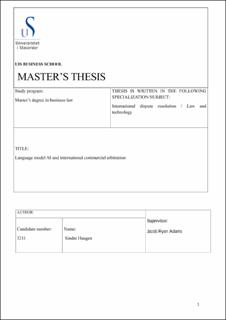| dc.contributor.advisor | Adams, Jacob Ryan. | |
| dc.contributor.author | Haugen, Sindre. | |
| dc.date.accessioned | 2023-09-09T15:51:41Z | |
| dc.date.available | 2023-09-09T15:51:41Z | |
| dc.date.issued | 2023 | |
| dc.identifier | no.uis:inspera:152010067:22583410 | |
| dc.identifier.uri | https://hdl.handle.net/11250/3088419 | |
| dc.description.abstract | This thesis dives deep into the world of a specific type of artificial intelligence (AI), Large Language Models (LLMs), and how they might impact international business disputes, or more specifically, international commercial arbitration.
In an age where rapid advancement in technology is quickly reshaping our world, the legal field isn't immune to this transformation. Among the game-changers, language model AI could, due to its promising capacity of data-processing and outcome prediction, potentially make international arbitration quicker and less expensive, thereby providing easier access to justice for the commercial sector across the globe.
However, it's not all smooth sailing. The study also identifies legal limitations regarding the use of LLMs in arbitration - issues related to bias, maintaining fair processes, keeping data private, and determining who is accountable when AI is involved. Overcoming these obstacles is crucial before AI can be confidently incorporated into arbitration.
While LLMs hold exciting potential for international commercial arbitration, careful implementation is important. We need comprehensive rules and guidelines to ensure language model AI operates effectively and ethically in this arena. The use of AI should be a considered decision, keeping in mind the potential hurdles and working towards mitigating them. | |
| dc.description.abstract | This thesis dives deep into the world of a specific type of artificial intelligence (AI), Large Language Models (LLMs), and how they might impact international business disputes, or more specifically, international commercial arbitration.
In an age where rapid advancement in technology is quickly reshaping our world, the legal field isn't immune to this transformation. Among the game-changers, language model AI could, due to its promising capacity of data-processing and outcome prediction, potentially make international arbitration quicker and less expensive, thereby providing easier access to justice for the commercial sector across the globe.
However, it's not all smooth sailing. The study also identifies legal limitations regarding the use of LLMs in arbitration - issues related to bias, maintaining fair processes, keeping data private, and determining who is accountable when AI is involved. Overcoming these obstacles is crucial before AI can be confidently incorporated into arbitration.
While LLMs hold exciting potential for international commercial arbitration, careful implementation is important. We need comprehensive rules and guidelines to ensure language model AI operates effectively and ethically in this arena. The use of AI should be a considered decision, keeping in mind the potential hurdles and working towards mitigating them. | |
| dc.language | eng | |
| dc.publisher | uis | |
| dc.title | Language model AI and international commercial arbitration | |
| dc.type | Master thesis | |
